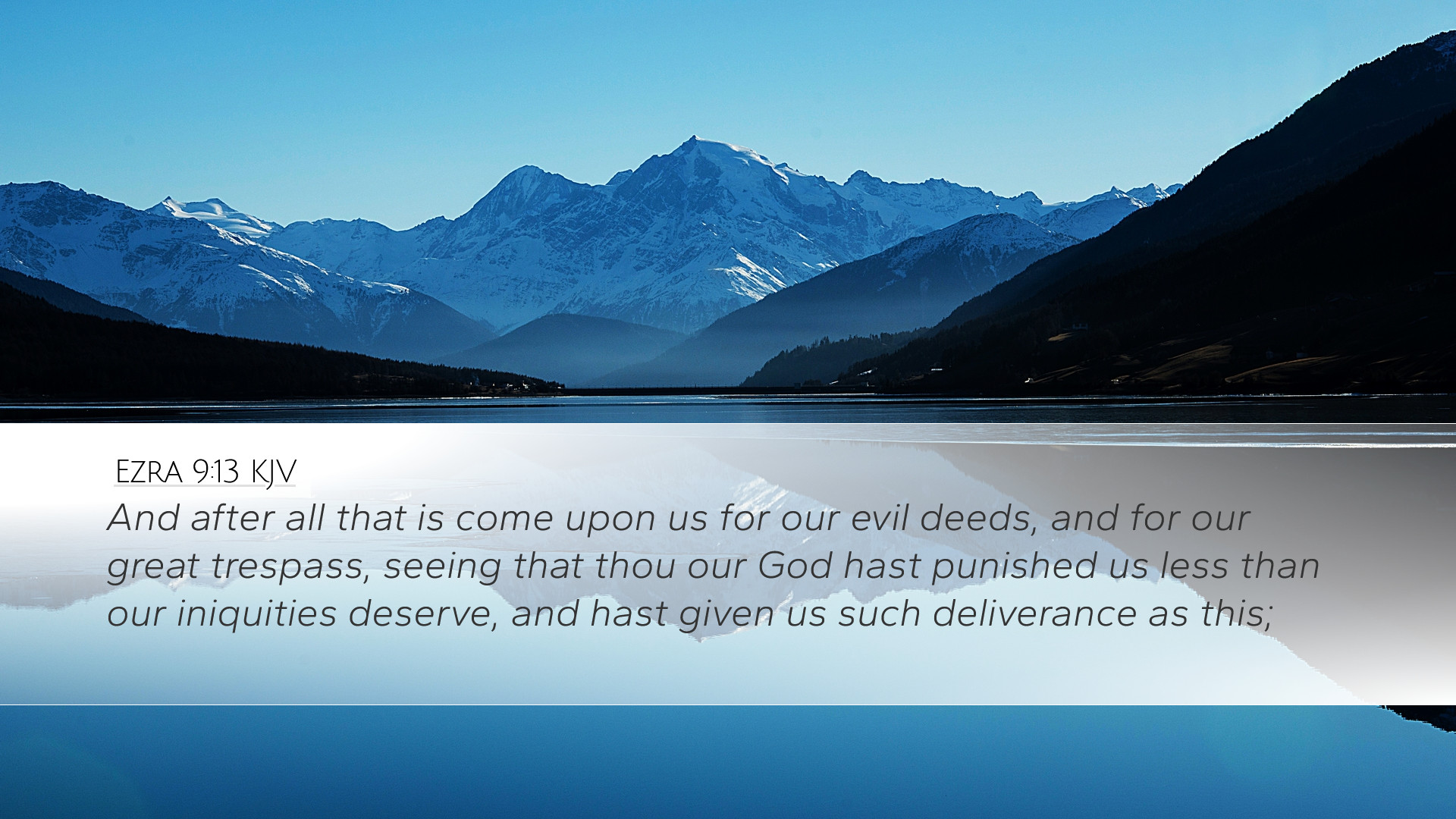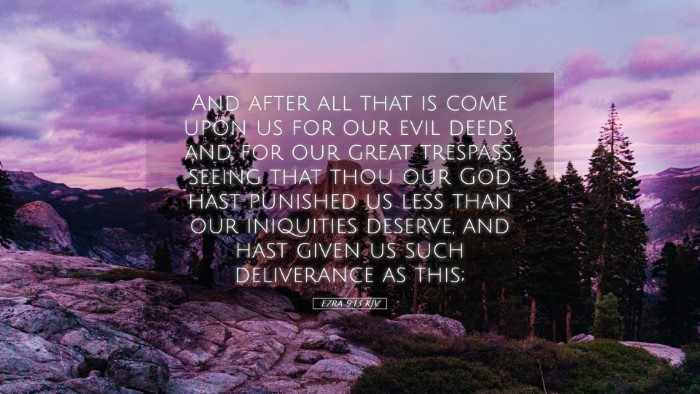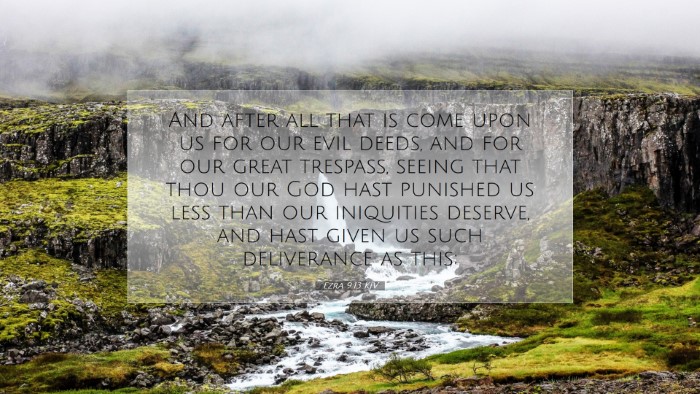Old Testament
Genesis Exodus Leviticus Numbers Deuteronomy Joshua Judges Ruth 1 Samuel 2 Samuel 1 Kings 2 Kings 1 Chronicles 2 Chronicles Ezra Nehemiah Esther Job Psalms Proverbs Ecclesiastes Song of Solomon Isaiah Jeremiah Lamentations Ezekiel Daniel Hosea Joel Amos Obadiah Jonah Micah Nahum Habakkuk Zephaniah Haggai Zechariah MalachiEzra 9:13
Ezra 9:13 KJV
And after all that is come upon us for our evil deeds, and for our great trespass, seeing that thou our God hast punished us less than our iniquities deserve, and hast given us such deliverance as this;
Ezra 9:13 Bible Commentary
Ezra 9:13 Commentary
Verse (Ezra 9:13): "And after all that is come upon us for our evil deeds, and for our great trespass, seeing that thou our God hast punished us less than our iniquities deserve, and hast given us such deliverance as this;"
Introduction
Ezra 9:13 serves as a contemplative reflection on God's justice and mercy. This verse occurs amidst a narrative that addresses the consequences of the Israelites' sins against God, highlighting their acknowledgment of divine grace despite their disobedience. The combined insights from Matthew Henry, Albert Barnes, and Adam Clarke emphasize key theological themes critical to understanding this passage.
Theological Themes
- Divine Justice and Human Iniquity: The verse begins with a recognition of the consequences of evil deeds. Matthew Henry eloquently suggests that the history of Israel, marred by their transgressions, demonstrates the seriousness with which God regards sin. Their suffering serves as a just response to their rebellion against divine law.
- God's Mercy: The phrase "punished us less than our iniquities deserve" highlights the attribute of mercy. Albert Barnes notes that while the Israelites faced repercussions for their actions, God’s responses were measured and comparatively light. This aspect of justice tempered by mercy is a recurring theme throughout scripture, demonstrating that while humanity deserves punishment, God often extends grace.
- The Importance of Confession: Ezra's prayer exemplifies the necessity of repentance. Adam Clarke refers to the critical nature of acknowledging one's sins before God, suggesting that true restoration begins with confession and recognition of divine grace. Humility in confessing sins is a prerequisite for receiving God's mercy.
- Deliverance as a Gift: The latter part of the verse acknowledges God's deliverance. Both Matthew Henry and Albert Barnes agree that the deliverance mentioned is a blessing, showcasing God’s willingness to rescue and redeem His people despite their failings. This serves as an encouragement for the faithful, indicating that no sin is beyond the reach of God's grace.
Exegesis of the Verse
The structure of Ezra 9:13 invites a deeper analysis of its components:
- “after all that is come upon us”: This phrase indicates the cumulative impact of their past iniquities, suggesting a weight of guilt that presses upon the community.
- “for our evil deeds, and for our great trespass”: The repetition underscores the gravity of their sins. Clarke emphasizes that acknowledging the gravity of one’s actions is essential for understanding the character of sin, which often leads to spiritual death.
- “seeing that thou our God hast punished us less than our iniquities deserve”: This highlights the paradox of divine discipline: punishment serves as a form of correction rather than an expression of wrath. Henry elaborates that God’s disciplinary actions are a demonstration of His love, aimed at guiding His people back to righteousness.
- “and hast given us such deliverance as this”: Here, the emphasis on deliverance points to the hope and restoration present in God’s plans. Barnes notes that this deliverance implies not merely escape from circumstances but a restoration of relationship and covenant.
Pastoral Applications
For pastors, this verse provides a rich source for preaching themes of sin, repentance, grace, and God’s unwavering faithfulness. The community is reminded that acknowledgment of sin is not a reason for despair but a doorway to divine mercy.
- Encourage Confession and Repentance: Pastors can encourage congregations to view confession not as a burden but as a necessary step toward spiritual health and healing.
- Highlight God’s Grace: The grace extended to Israel serves as a model for the modern believer—that deliverance is available through repentance, reinforcing the message of the gospel.
- Teach on Divine Justice: Understanding that sin has consequences is essential for a well-rounded theology; emphasizing God's justice can lead to more profound reverence and fear of God.
Conclusion
Ezra 9:13 encapsulates a vital aspect of the Christian faith—acknowledging our shortcomings while simultaneously embracing the incredible mercy of God. The insights drawn from the commentaries of Henry, Barnes, and Clarke collectively inform a comprehensive understanding of this verse. As students, theologians, and scholars delve into this passage, they discover the intricate balance of justice and mercy that characterizes God's relationship with humanity.


